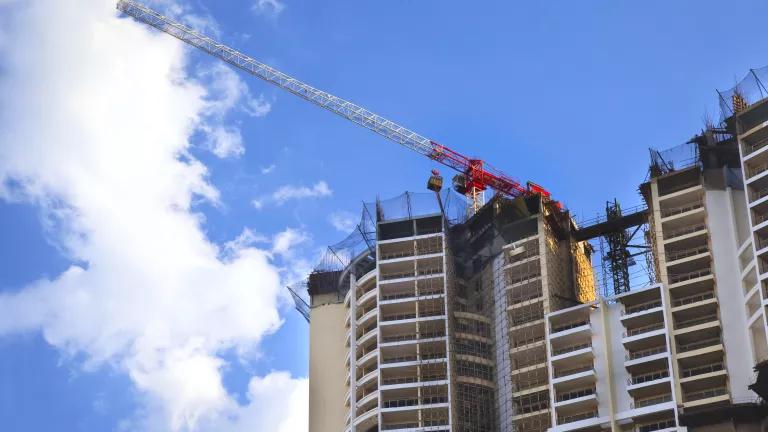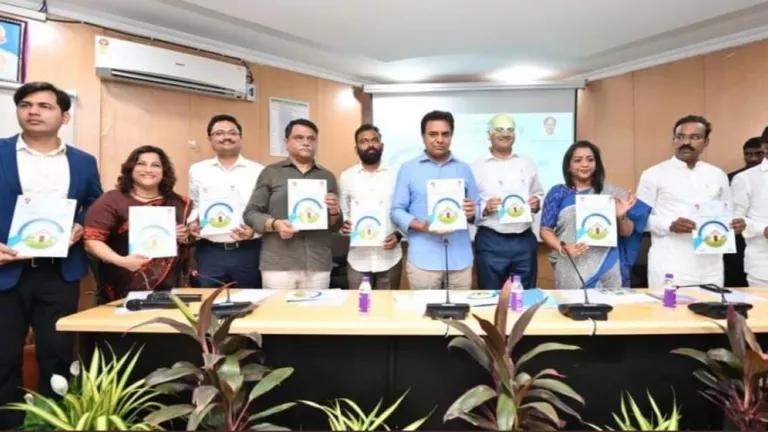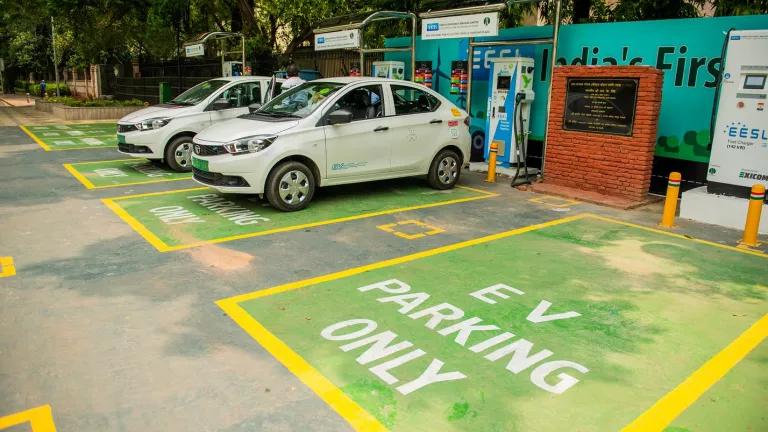Constructing Change with Building Energy Codes in India
By 2030, India will have added nearly one billion square meters of new commercial floor space--more than the land area of New York City and Washington D.C combined. Building smart from the start is a real opportunity to reduce emissions, save energy and enhance prosperity.
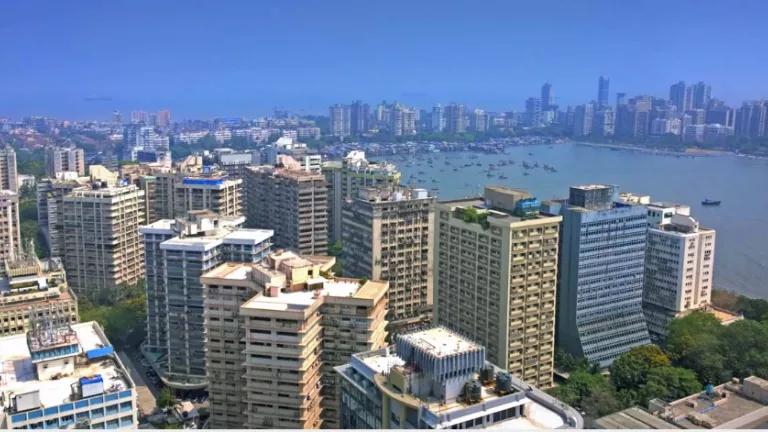
Landscape of Buildings in a City in India
Co-authored with Jessica Korsh
By 2030, India will have added nearly one billion square meters of new commercial floor space—more than the land area of New York City and Washington D.C combined. Building smart from the start is a real opportunity to reduce emissions, save energy and enhance prosperity. The good news is that India is committed to energy efficient buildings, which are central to India’s Nationally Determined Contributions under the Paris Climate Agreement.
Buildings in India are the second largest consumer of electricity and will likely become the largest by 2030. Building energy codes that ensure energy savings in construction and operation of buildings have existed in India since 2007 and have the potential for huge energy savings. NRDC and Administrative Staff College of India (ASCI) estimate country wide implementation of India’s Energy Conservation Building Code (ECBC) could avoid 1,065 metric tons of carbon dioxide between 2019 and 2030. Significant progress in implementation of these codes has been made; however, there is still much left to be done to realize the savings potential that full code compliance could bring.
New Programs on Energy Efficiency
New initiatives for the built environment were released last month by its national nodal agency on energy efficiency, the Bureau of Energy Efficiency (BEE). These initiatives ranged from a revised code for residential buildings, an extensive training programme for building architects and engineers on building energy codes, an online directory of building materials and awards for exemplary energy efficient building design. These initiatives will provide a further push to increase energy efficiency in the built environment. The National Energy Efficiency Roadmap for Movement Towards Affordable and Natural Habitat (NEERMAN) Awards, announced by the Indian Minister of Power and Renewable Energy, R. K. Singh, will provide national-level recognition for exemplary building designs that comply with BEE’s Energy Conservation Building Code (ECBC). The NEERMAN awards are another example that building energy codes are critical for India to save energy, reduce pollution, and move toward net-zero emissions.
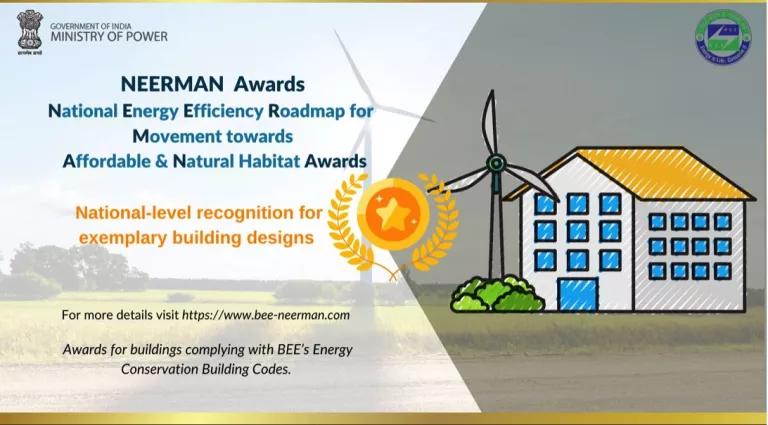
BEE also released a revised and a complete version of residential building energy code Eco Niwas Samitha 2021, which now includes all building systems in addition to the building envelope included the earlier version of the code. More details on the other initiatives launched at the event are here.
States in India Are Taking Action
While the national government sets building standards, it is the states that amend, notify, adopt and implement the code. Today, 18 states and two union territories (UTs) have notified ECBC 2007 and ECBC 2017. In June 2021, Madhya Pradesh became the 18th state to adopt ECBC, and made it mandatory for all new commercial buildings after November 1, 2021.
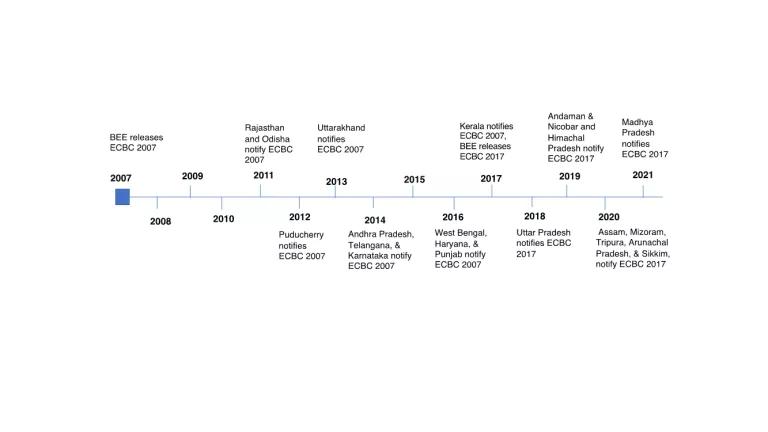
ECBC Notification Timeline Across States in India
Telangana and Andhra Pradesh are leaders spearheading efforts to notify and implement ECBC. Both states are driving code compliance by strengthening technical capacity, empaneling third party assessors, creating a two-tier approach for design and construction, and incorporating ECBC into their city-wide online building compliance systems. NRDC and ASCI have been working as knowledge partners in both the states since 2011. Since then, more than 500 buildings in Telangana and Andhra Pradesh have complied with ECBC.
Uttar Pradesh was the first state to notify the updated version of the code, ECBC 2017. It is successfully implementing the ECBC as part of the building bylaws in more than 27 development boards in cities across the state. As of 2021, Uttar Pradesh has over 134 buildings that are ECBC compliant in the design or implementation stage.
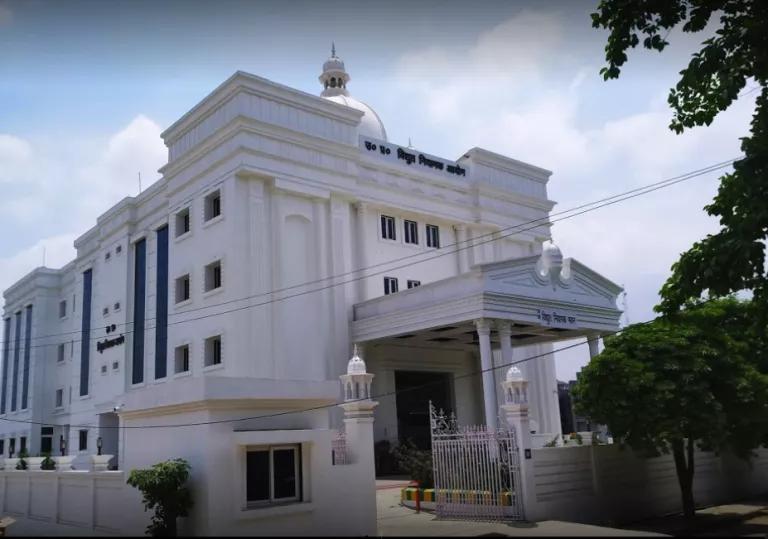
ECBC Compliant Building in Uttar Pradesh
Looking Ahead to Gujarat and Maharashtra
Gujarat and Maharashtra are key states in India’s transition to energy efficient buildings. The land area of the two states combined is more than that of California. Successful implementation of the code in these two states will take India’s efforts on building energy savings to the next level. NRDC and partners are working with stakeholders in both Gujarat and Maharashtra to develop a code implementation framework.
Gujarat is a leading industrialized state in India. One study estimates that ECBC implementation with high code compliance would yield tremendous savings in Gujarat: the state would save 6,200 megawatts (MW) of electricity capacity addition and $9 billion in avoided capacity additions and operation and maintenance costs by 2050. These are big numbers and will drive action on code implementation. While the state is moving towards the adoption of ECBC 2017 with an amended building code—it is important for the state to fast-track incorporation of ECBC into the Gujarat’s broader building compliance process.
Maharashtra, the largest state economy in India, has taken initial steps to draft a state amended code. It has identified the roles of different stakeholders and completed demonstration projects to showcase the actual energy savings of ECBC compliant buildings. In 2021, the state constituted a technical committee with officials from the urban development and housing departments to fast-track notification. A simple compliance process, backed by a pool of certified experts to support the real estate developers with compliance, will be important for a large state like Maharashtra to successfully implement ECBC.
There is increasing recognition accompanied by action in India on the value of achieving energy savings through energy efficiency in the built environment. However, to truly realize the potential savings, a greater focus on implementation and compliance is needed.
Prima Madan is a cooling and efficiency expert working as a consultant with NRDC.
Jessica Korsh is a climate and health expert working with NRDC.



